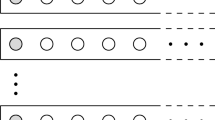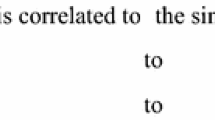Abstract
The use of tensed language and the metaphor of set ‘formation’ found in informal descriptions of the iterative conception of set are seldom taken at all seriously. Both are eliminated in the nonmodal stage theories that formalise this account. To avoid the paradoxes, such accounts deny the Maximality thesis, the compelling thesis that any sets can form a set. This paper seeks to save the Maximality thesis by taking the tense more seriously than has been customary (although not literally). A modal stage theory, \({\textsf{MST}}\), is developed in a bimodal language, governed by a tenselike logic. Such a language permits a very natural axiomatisation of the iterative conception, which upholds the Maximality thesis. It is argued that the modal approach is consonant with mathematical practice and a plausible metaphysics of sets and shown that \({\textsf{MST}}\) interprets a natural extension of Zermelo set theory less the axiom of Infinity and, when extended with a further axiom concerning the extent of the hierarchy, interprets Zermelo–Fraenkel set theory.
Similar content being viewed by others
References
Boolos, G. (1971). The iterative conception of set. The Journal of Philosophy, 68(8), 215–231. Reprinted in G. Boolos (1998). Logic, logic, and logic. Cambridge, MA.: Harvard Univesity Press. Page references to reprint.
Boolos, G. (1989). Iteration again. Philosophical Topics, 17, 5–21. Reprinted in G. Boolos (1998). Logic, logic, and logic. Cambridge, MA.: Harvard Univesity Press. Page references to reprint.
Boolos, G. (1995). The logic of provability. Cambridge: Cambridge University Press.
Braüner, T., & Ghilardi, S. (2007). First-order modal logic. In: P. Blackburn, J. van Benthem, F. Wolter (Eds.), Handbook of modal logic. Amsterdam: Elsevier.
Bull, R., & Segerberg, K. (2001). Basic modal logic. In: D. Gabbay & F. Guenthner (Eds.), Handbook of Philosophical Logic (2nd ed., Vol. 3). Dordrecht: Kluwer.
Burgess, J.P. (2002). Basic tense logic. In: D. Gabbay & F. Guenthner (Eds.), Handbook of philosophical logic (2nd ed., Vol. 7). Dordrecht: Kluwer.
Burgess, J.P., & Rosen, G. (1997). A subject with no object. Oxford: Clarendon Press.
Cartwright, R. (1994). Speaking of everything. Noûs, 28(1), 1–20.
Dummett, M. (1991). Frege: Philosophy of mathematics. London: Duckworth.
Fine, K. (1981). First-order modal theories I—sets. Noûs, 15(2), 177–205.
Fine, K. (2005). Our knowledge of mathematical objects. In: T.S. Gendler & J. Hawthorne (Eds.), Oxford studies in epistemology (Vol. 1). Oxford: Clarendon Press.
Fine, K. (2006). Relatively unrestricted quantification. In: A. Rayo & G. Uzquiano (Eds.), Absolute generality. Oxford: Oxford University Press.
Gödel, K. (1964). What is Cantor’s continuum problem? In: P. Benacerraf, & H. Putnam (Eds.) (1983). Philosophy of mathematics: selected readings (2nd ed.). Cambridge: Cambridge University Press. Revised and expanded version of Gödel, K. (1947). What is Cantor’s continuum problem? The American Mathematical Monthly, 54(9), 515–525.
Goldblatt, R. (1992). Logics of time and computation (2nd ed.). Stanford, CA.: CSLI.
Jech, T. (2003). Set theory (3rd, revised ed.). New York, NY.: Springer.
Lévy, A. (1960). Axiom schemata of strong infinity in axiomatic set theory. Pacific Journal of Mathematics, 10(1), 223–238.
Lévy, A., & Vaught, R. (1961). Principles of partial reflection in the set theories of Zermelo and Ackermann. Pacific Journal of Mathematics, 11(3), 1045–1062.
Linnebo, Ø. (2010). Pluralities and sets. The Journal of Philosophy, 107(3), 144–164.
Mathias, A. (2001). Slim models of Zermelo set theory. Journal of Symbolic Logic, 66(2), 487–496.
Parsons, C. (1977). What is the iterative conception of set?. In: R. Butts & J. Hintikka (Eds.), Proceedings of the 5th international congress of logic, methodology and philosophy of science 1975, part I: Logic, foundations of mathematics, and computability theory. Dordrecht, Reidel. Reprinted in P. Benacerraf, & H. Putnam (1983). Philosophy of mathematics: selected readings (2nd ed.). Cambridge: Cambridge University Press. Pages references to reprint.
Parsons, C. (1983) Sets and modality. In: Mathematics in philosophy. Ithaca, NY: Cornell University Press.
Paseau, A. (2007). Boolos on the justification of set theory. Philosophia Mathematica, 15(1), 30–53.
Potter, M. (2004). Set theory and its philosophy: A critical introduction. Oxford: Oxford University Press.
Scott, D. (1974). Axiomatizing set theory. In: Axiomatic set theory II: Proceedings of symposia in pure mathematics (Vol. 13). Providence, RI., American Mathematical Society.
Shoenfield, J. (1967) Mathematical logic. Reading, MA.: Addison-Wesley.
Uzquiano, G. (1999). Models of second-order Zermelo set theory. Bulletin of Symbolic Logic, 5(3), 289–302.
Venema, Y. (2001). Temporal logic. In: L. Goble (Ed.), The Blackwell guide to philosophical logic. Oxford: Blackwell.
Wang, H. (1974). From mathematics to philosophy. London: Routledge.
Author information
Authors and Affiliations
Corresponding author
Additional information
Thanks to Denis Bonnay, Øystein Linnebo, Sam Roberts, Gabriel Uzquiano, Timothy Williamson and anonymous referees for helpful written comments on earlier versions of this paper, and to audiences in Oxford, Cambridge, London and Paris for their questions and comments.
Rights and permissions
About this article
Cite this article
Studd, J.P. The Iterative Conception of Set. J Philos Logic 42, 697–725 (2013). https://doi.org/10.1007/s10992-012-9245-3
Received:
Accepted:
Published:
Issue Date:
DOI: https://doi.org/10.1007/s10992-012-9245-3




